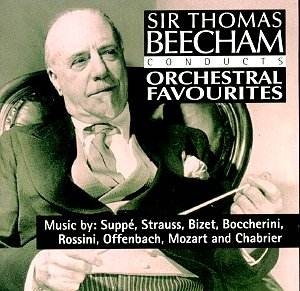AVAILABILITY
www.sonyclassical.co.uk
The latest batch of Beecham Sonys has some delectable
fare, mostly lighter it’s true this time around. I’ll be reviewing
them all in due course but went straight to this fizzing selection
of pops. It makes a blistering start with the Suppé, which
is played to extract maximal contrasts both of mood and volume
as note writer Graham Melville-Mason rightly says. The brass calls
are resilient, the phrasing pliant when need be, the stentorian
co-existent with the sentiment. I liked the Strauss with Beecham’s
easy geniality and black-as-pitch basses though I doubt on this
showing he was Barbirolli’s superior in this repertoire, to name
one British colleague with whom he was on uneasy terms (which
was most of them). The fun really starts with the Bizet, always
a speciality of his. The burnished curve of the strings and the
winds’ coil announce a delectably superior reading. The wind section
features Gerald Jackson, Terence McDonagh, Gwydion Brooke and
Jack Brymer, the famous Royal Family and one can listen to McDonagh’s
oboe in the first Serenade in an atmosphere of untroubled delight.
The engineers took care over the percussion in these sessions
and over the triangle that tingles prominently in the March –
superb wind chording by the way as Beecham brings out Bizet’s
quirky orchestration with something not unadjacent to glee. The
concluding Danse is truly diaphanous, light and aerated, but with
increasingly crisply articulated violins.
The Boccherini is elegant and frilly with some
powerful drive whilst the Rossini allows one to hear Dennis Brain
in all his glory – middle of the road tempo from Beecham here.
The Offenbach is apparently making its first ever appearance.
The Overture is bluff and the Chorus rather overdoes the G and
S approach in their contributions but there is beautiful orchestral
playing in the Romance. Maybe the messy and muddy choral/orchestral
balance in this movement did for this recording (the notes don’t
say why it was withheld). But we end on an idiosyncratically high
note with a very cellistic Barcarolle. His beloved Mozart is here
– big-boned dances and brassy with the posthorn played by Richard
Walton. The Chabrier is a rip-roaring send off, full of vivacity
and brio. Is the blip at 3.38 on the original copy?
The residual studio noise inherent in these 1950-1953
tapes is there – if you listen very closely you can hear atmospheric
bows on music stands, some squeaking chairs and they add to the
concentrated vivacity of these delightful sessions.
Jonathan Woolf
